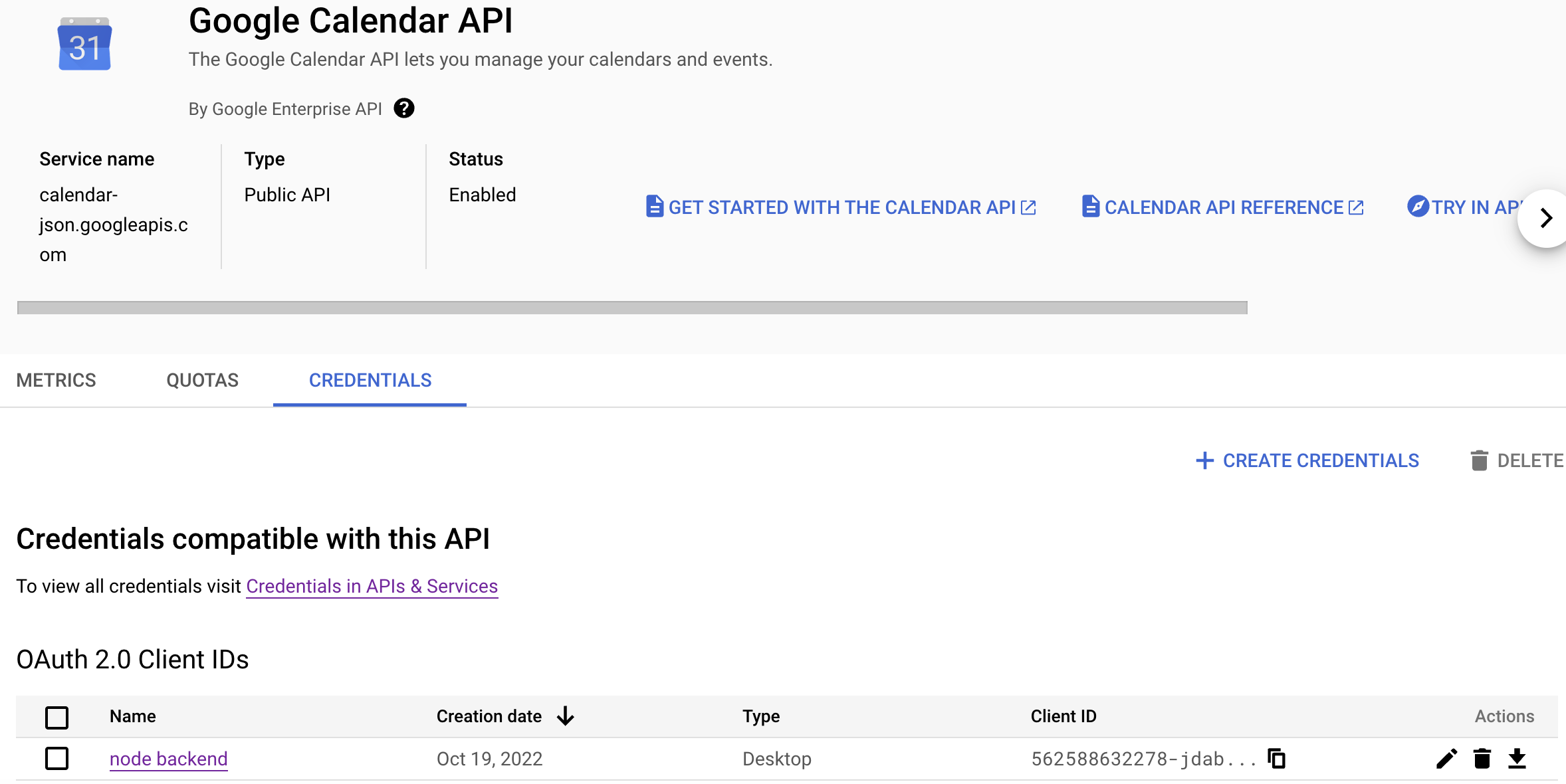Authentication using Node.js OauthClient "auth-code" flow
I'm building a SaaS application which require read-access to a user's google calendar. After the user gives consent to access their calendar during the first sign-in, I want the application to be able to authorize itself to access any of the user's calendars at any time without having to prompt the user for authorization again.
Currently I'm trying to create an authentication flow following the '@react-oauth/google' node library (specifically the "authorization code flow" here: https://react-oauth.vercel.app/). In my frontend, I get a code from the user, which is sent and successfully received by my backend. The backend is then supposed to use the code to get an access token and a refresh token for that user, but the request to exchange the code for the access token (oAuth2Client.getToken(req.body.code);) is failing with error 401 (unauthorized client.)
My ultimate goal is to store the access token and refresh token in a database somewhere so that I can access that user's calendar later at any time.
If I treat the backend as an Oath Client on google cloud and pass in the credentials for that, I get error 401 - unauthorized client, but I've given it access to the calendar api on google console, as you can see in the image:

How can I resolve the issue that I'm facing?
I started reading about service accounts that can do this for you but I'm unsure how to proceed. I saw that they can do domain wide delegation but my users will be signing in from their personal gmail accounts so that option is not applicable for me.
Frontend Code:
import { useGoogleLogin } from '@react-oauth/google';
import axios from 'axios';
export const LoginModal = () => {
const googleLogin = useGoogleLogin({
flow: "auth-code",
onSuccess: async codeResponse => {
console.log(codeResponse);
const tokens = await axios.post("http://localhost:3001/auth/google/", {
code: codeResponse.code
});
console.log(tokens);
}
})
return (<>
...some html code
<button onClick={() => { googleLogin() }}>
..some more html code
</>)
}
Backend Code:
require('dotenv').config();
const express = require('express');
const {
OAuth2Client,
} = require('google-auth-library');
const cors = require('cors');
const app = express();
app.use(cors());
app.use(express.json());
const CLIENT_ID = "xxx";
const CLIENT_SECRET = "xxx";
// initialize oathclient
const oAuth2Client = new OAuth2Client(
CLIENT_ID,
CLIENT_SECRET,
'postmessage',
);
// get token from code given from frontend
app.post('/auth/google', async (req, res) => {
console.log(req.body.code)
const { tokens } = await oAuth2Client.getToken(req.body.code); // exchange code for tokens
res.json(tokens);
});
app.post('/auth/google/refresh-token', async (req, res) => {
const user = new UserRefreshClient(
CLIENT_ID,
CLIENT_SECRET,
req.body.refreshToken,
);
const { credentials } = await user.refreshAccessToken(); // obtain new tokens
res.json(credentials);
})
app.listen(3001, () => {
console.log(`server is running`)
});
I figured it out. Basically, I was putting in the wrong clientid/client secret in my google console because I thought the frontend and backend needed different oauth client IDs. I used the same oauth client secret/id for frontend and backend and made sure to follow the answers here: https://github.com/MomenSherif/react-oauth/issues/12
MAKE SURE TO PUT "postmessage" AS YOUR REDIRECT_URI! It will not work without that.
Working code:
frontend is the same
backend:
require('dotenv').config();
const express = require('express');
const {
OAuth2Client,
} = require('google-auth-library');
const cors = require('cors');
const app = express();
app.use(cors());
app.use(express.json());
const CLIENT_ID = XXX
const CLIENT_SECRET = XXX
// initialize oathclient
const oAuth2Client = new OAuth2Client(
CLIENT_ID,
CLIENT_SECRET,
'postmessage',
);
// get token from code given from frontend
app.post('/auth/google', async (req, res) => {
console.log("got request!")
console.log(req.body.code)
const { tokens } = await oAuth2Client.getToken(req.body.code); // exchange code for token
res.json(tokens);
});
app.listen(3001, () => {
console.log(`server is running`)
});- Can't execute git command in nodejs
- what does express-async-handler do?
- How to get notified when a redis key expired?
- Error ERR_REQUIRE_ESM require() of ES Module
- Using nodemon Server Listining on port: 4000 but finally [nodemon] app crashed
- Parsing Query String in node.js
- Using nodemon I am facing error - ReferenceError: app is not defined
- React serverside, webpack
- Why does "No license field" Warning Disappear when you set "private": true in your package.json
- Access raw body of Stripe webhook in Nest.js
- IN clause in mysql nodejs
- is there a require for json in node.js
- How should I call two endpoints when one depends on the other one?
- How do you send FormData with Axios?
- Exec : display stdout "live"
- Is keep alive set to true by default for outgoing calls from nestjs application
- Maximum number of entries in Node.js Map?
- How do I specifically use an NPM local dependency for local development and one from an external registry for production?
- Vitest : cannot find package 'rollup'
- how to resolve "../pkg" in node_modules
- Trying to implement Whatsapp Calling API using WebRTC
- Why do I get [next-auth][error][CLIENT_FETCH_ERROR] message:undefined?
- How to get a React.js app running on Azure App Services?
- How to augment process.env in TypeScript?
- Can I reset a user's password using the Firebase Admin SDK for Node?
- How to set the NODE_ENV with npm script on windows?
- npm: When to use `--force` and `--legacy-peer-deps`
- Node.js not recognizing .env file
- EACCES: permission denied, mkdir '/usr/local/lib/node_modules/react-native-cli'
- Node.js mssql multiple concurrent connections to SQL servers interfering with each other